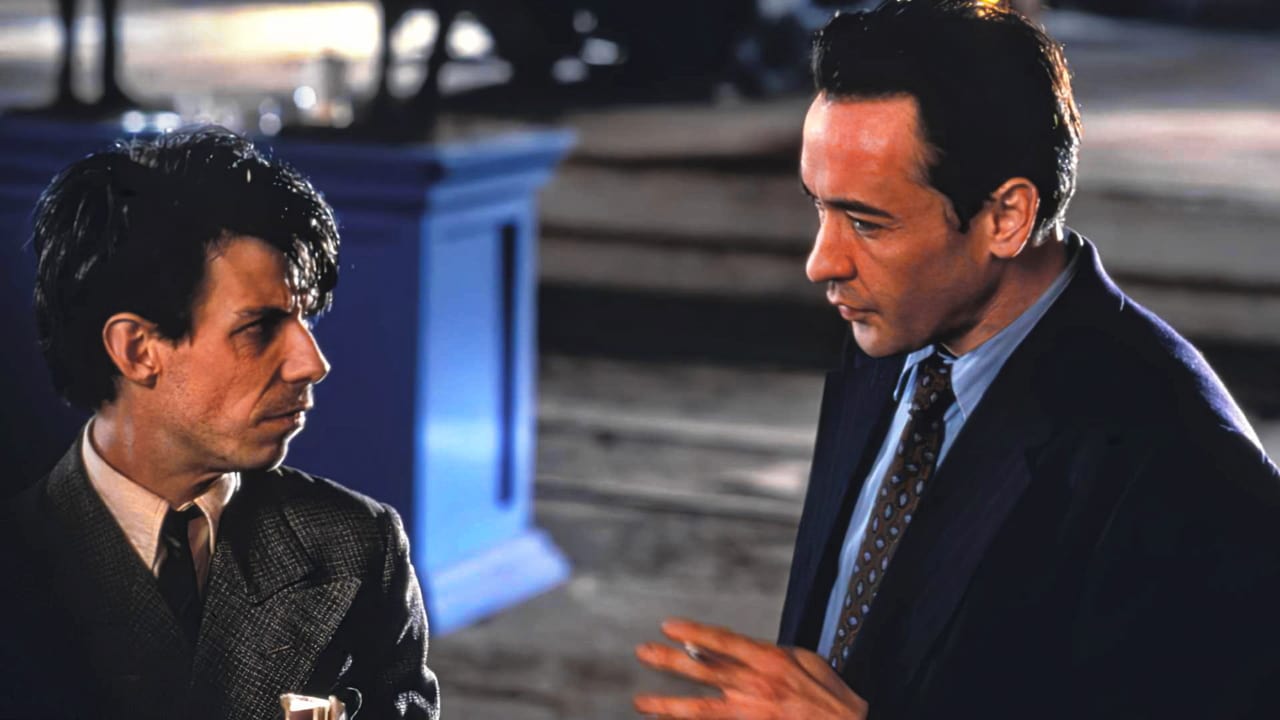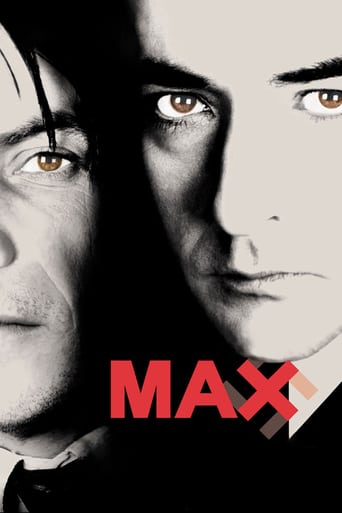

Save your money for something good and enjoyable
... View MoreGreat story, amazing characters, superb action, enthralling cinematography. Yes, this is something I am glad I spent money on.
... View MoreClose shines in drama with strong language, adult themes.
... View MoreMostly, the movie is committed to the value of a good time.
... View MoreMore often than not, as this film ground relentlessly forward, I found myself wondering just exactly what the point of it all was - at least, when I wasn't struggling to keep my eyes open. "Plodding" would be one way to describe the pacing of the movie, with "bewildering" being one way to sum up the plot. I suppose you could say that it traces some of the early development of Hitler's anti-semitism (which, like the plot, seems a bit muddled in this movie) but in general "Max" just seems grievously lacking in purpose and direction. The performances are its primary redeeming quality; with John Cusack as Max Rothman and Noah Taylor as the young Hitler both offering decent enough performances which helped make this watchable. The story is pure fiction, based on some obvious historical inaccuracies - the most obvious of which is that Hitler, as far as I know, wasn't much involved as an artist in 1918. His "artistic" period was pre-World War I in Vienna. That aside, the story depicts the cautious relationship between Hitler the artist as the War is coming to an end and Rothman the Jewish art dealer who becomes interested in Hitler's work and tries to encourage him to release his inner rage on canvass - which would have been a service to history and humanity. It's intriguing to the extent that Hitler did have some complicated relationships with Jews in his earlier years, including the Jewish family doctor who treated his dying mother and to whom Hitler gave protection after coming to power. And you do find yourself wondering what the world would be like today if Hitler had succeeded as an artist rather than in politics.Interesting - but in the end this movie is pure fantasy, with no basis in reality. Performances aside, I'll remember it (to the extent that I remember it at all) for its poor pace and weak storyline. (3/10)
... View MoreI found this attempt to recreate how the monster Hitler evolved during the period after WWI highly admirable: it has a great sense of period, contrasting the comfortable civilized life led by German Jews with those of other German citizens who after the humiliation of WWI were not so comfortable; John Cusack is perfectly cast in a witty, mature role, a man who should be bitter and cynical, but is saved by his education.The problem for me is Adolph--how can anyone play Hitler? Lots of great actors have attempted the task--Guinness, Richard Basehart, Anthony Hopkins, and for comedy Chaplin and Ionesco's favorite, Bobby Watson--but only one has captured the fiendish maniacal madness that the man must have had to induce mass hypnotism on a nation, to persuade civilized folks to exterminate another race, and that is Bruno Ganz in the splendid end-of-days drama Downfall, and we only meet him in the last doomed days of the Third Reich.Noah Taylor does his level best to meet the challenge of the developing messianic leader, and, in the course of the film, many excellent arguments about the nature of art are poised; but ultimately the film did not work for me because I'm not sure one can effectively portray Hitler--or Garbo--or Einstein--I'm sure you could make up your own list. The film is never dull, and except for a predictable last five minutes, thoughtful and provocative.
... View More"Max" is a tale of two very different young German WWI vets who meet after their fatherland loses the Great War. Of course, it is at this time that the nascent nazi party gains members and power in its quest to seek revenge against the Allies, communists and Jews. John Cusack plays Max, a successful bourgeois Jewish art dealer, formerly-known-as-artist-prior-to-losing-arm-in-WWI. This thoughtful lad ambles on seemingly without a care in these troubled times and befriends a foul, belligerent wanna-be artist named Adolf Hitler, played by an all-around gruesome Noah Taylor. I DO applaud Taylor's acting as he conducts himself as I believe the infamous young AH probably did.This film is riddled with absurdities, and one can only imagine why a happy-go-lucky Jewish art dealer would bother with this asexual bore, whose artistic taste and talents ultimately reveal that he has none. But Max seems relentless to win over the depressed and lost Hitler. (Max truly IS a good egg I must say. Personally, I would welcome his friendship.)As the Prussian anger and resentment toward the Treaty of Versailles' implications and the Jews become increasingly and dangerously pervasive, the story continues with jovial Max encountering in town a very frustrated and scowling Hitler. Max gives a shout with, "Hey Hitler, let me buy you a lemonade!" And off the two go. Puh-leez! AND, to top it off, the lemonade does nothing to lift AH's spirits.A waste of time to see? In my opinion, you bet. On the other hand, if you like a dark comedy, this may be your kind of flick! I wish "MST-3K" could have had a stab at it. That would have been a roar! On that note, do not get me started on the performance art à la stage-set, human-sized meat grinder. Sauve qui peut!Well, you'll suffer no loss if you say "auf wiedersehen" to this film ASAP. Or, you may get some chuckles before pitching the TV Brick. Best of luck to you.
... View MoreWho was the world's most infamous monster before he became the world's most infamous monster? That's one of the subjects tackled in 'Max', which I would have titled 'Hitler and Me'.Being fairly well versed in World War II history and having read 'Mein Kampf', I honestly didn't find the humanistic depiction of Hitler that controversial. Hitler may have ultimately been responsible for one of several major inhuman events in history, his just happens to be one of the more recent, but only humans can be inhuman. Though given the politically correct, and highly oversensitive nature of society today, it's not difficult to imagine people finding the subject "offensive". The film actually plays into this preconception, and a very human Hitler is a clever platform for the subject of the film, which is actually art and expression, and the main character, Max Rothman (John Cusack), delights in shattering social morays with his artwork.Rothman is a Jewish art dealer from a wealthy family, who develops an interest in a poor, struggling, and embittered young Adolf Hitler. Having both served in the "Great War", and with Rothman taking pity on Hitler, an interesting dichotomy between the two men forms an unusual relationship. The two seem to be polar opposites, not only in their backgrounds and personalities, but also in their approach to their work, but they have more in common than is readily apparent. The difference is in their expression.Max, feeling slighted by the loss of his right arm, has embraced modernism, or abstract art, which is comparatively a mockery of traditionalism. Modernism, for Rothman, is his way of getting back at society for what it has done to him.Paradoxically, Hitler is the traditionalist. He despises abstract art, yet Rothman deals primarily in modernism. Still living in the barracks of the German army, homeless with no friends or family, and desperately trying to get Rothman to sell his work at a time when abstract modernism was all the rage (and sadly, still is), he too feels as though life has stolen something from him. But where Rothman takes his revenge conceptually in the art world, Hitler begins to plot his in another art medium that is perhaps even more grossly misunderstood today than it was then, oratory and politics. Just as the two are the verge of a mutual understanding of one another, a breakthrough realization of commonality, a few sad twists by a cruel fate intervene, and the rest is history.John Cusack is charming as Rothman, the affable and seemingly carefree fellow, who secretly bears disdain for the society that has pointlessly "disarmed" him. Noah Taylor is exceptional as der Fuhrer, whose own disdain for society he makes well known to all who hear his screaming, sociopathic rants that helped catapult him to the most well-known fascist dictator in modern history, but what he keeps secret, buried forever by a world that will only see a monster, is a sentimentality, a love, for art. A love he could afford that Rothman could not. Art students may find the traditionalist/modernist debate interesting. Prior to seeing the film, I once wrote a scathing essay on Marcel DuChamp, who is actually mentioned in the movie, criticizing his modern art piece "The Fountain", the urinal he painted and submitted to a New York gallery. It was basically a rant against modern art that was not at all unlike Hitler's criticisms of modern art in the film. I've actually seen some of Hitler's watercolors, which from what I've heard are his only surviving works. They're scenic houses, surprisingly calming and serene. One of Rothman's "displays" in the film, raises an interesting question... "What could have been?"
... View More